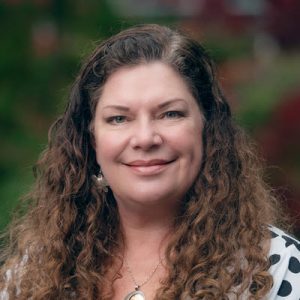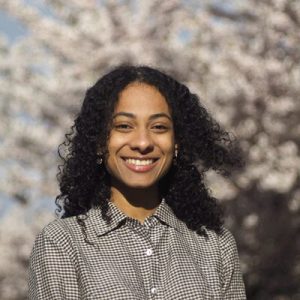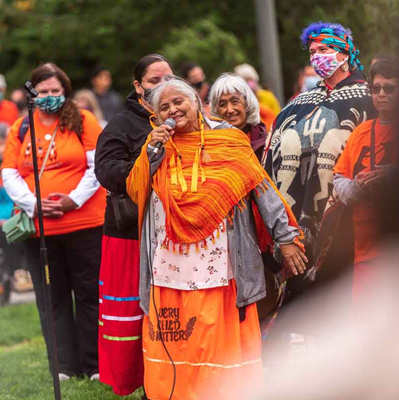Orange shirts flooded the University of British Columbia’s Main Mall. It was a gathering of unprecedented scale. Side by side, strangers marched together to commemorate the residential school experience and to commit to the ongoing process of reconciliation. This was the 2021 Intergenerational March to Commemorate Orange Shirt Day hosted by STEM faculties. What an auspicious way to begin a new academic year at UBC.
Orange Shirt Day is an annual commemoration held on September 30th. But how did this begin?
In May 2013, in Williams Lake, BC, the St. Joseph Mission Residential School (SJM) Commemoration Project and Reunion events brought together former students and their families. The project was the vision of Esk’etemc (Alkali Lake) Chief Fred Robbins, a former student at SJM. Phyllis (Jack) Webstad, a member of the Stswecem’c Xgat’tem First Nation was also a student there. It was Phyllis’ shiny, new orange shirt—a gift from her grandmother in anticipation of starting school that was taken from her upon her arrival—that has become the centre of a movement dedicated to honouring survivors, and the children who never came home. Read more about Phyllis’ story in her own words here.
In 2021, the Federal government designated September 30th as National Day for Truth and Reconciliation, and the BC Provincial government has designated it a statutory holiday for public sector employees. Orange Shirt Day is a living legacy of the St. Joseph Mission Residential School Commemoration Project and Reunion events and provides an opportunity for all Canadians to join in honouring Residential School survivors, their families and the broader Indigenous community who continue to be affected.
Bringing Orange Shirt Day to UBC
An integral person behind the Intergenerational March to Commemorate Orange Shirt Day is Dana-Lyn Mackenzie, a member of the Hwlitsum First Nation. “My family has deep roots here,”

Dana-Lyn Mackenzie
Dana-Lyn explains. “My parents were born in British Columbia, and the Coast Salish people, on my father’s side, have been here for time immemorial. Even my great Uncle Edward Williams, on my father’s side, has Williams Road in Richmond named after him.” With such a strong connection to the people and the land, Dana-Lyn pursued studies at UBC and became a double alumna with both a Bachelor of Arts and Juris Doctor degree.
Dana-Lyn subsequently practiced criminal, employment and administrative law, and held the position of Associate Director of Indigenous Legal Studies at the Peter A. Allard School of Law at UBC. Her work in Indigenous awareness, programming and student services garnered the prestigious President’s Staff Award on Advancing Diversity and Inclusion for 2016. Dana-Lyn is now a Senior Manager of EDI and Indigeneity and is cross-appointed at the Faculty of Applied Science and the Faculty of Land and Food Systems. “I am proud of UBC as not only my employer but my alma mater, with their commitment towards EDI and Indigeneity,” Dana-Lyn reflects. “I’m honored to be helping to implement the Indigenous Strategic Plan within the two faculties.”
The first Orange Shirt Day Intergenerational March was held in 2019 by UBC’s Faculty of Applied Sciences and was organized by Danilo Caron, a Master of Science student at the time. “This first event was a more intimate setting with the Adjunct Professor of First Nations and Endangered Languages Program, Elder Larry Grant, and the founding director of the First Nations House of Learning at UBC, Verna Kirkness, providing pivotal assistance in its success,” Dana-Lyn recounts. “I undertook my current role at UBC in 2021 and that same year, I met with Danilo and together we applied the original framework he had created for a second iteration of the Orange Shirt Day Intergenerational March.”
In the summer of 2021, they were approached by other STEM faculties to collaborate on the event. “The discovery of unmarked graves in Kamloops around this time prompted many units to take action and do what they could to support the Indigenous community,” Dana-Lyn recalls. “We originally ordered 125 pieces of bannock (traditional Indigenous bread), but this was nowhere enough for the surprising number of participants this event garnered. Luckily this year we’ll have a Mr. Bannock food truck, which is exciting!”
Orange Shirt Day highly anticipated this year
This year Dana-Lyn is happy to have the continued support of the Indian Residential School History and Dialogue Centre, which has acted as a central communications hub with a webpage dedicated to events happening in September. The Centre also acts as a hub for the elders, speakers and drummers to gather and prepare for the event. “We’ve booked the Coastal Wolf Pack to perform and the Musqueam will provide an elder for the opening to give the territorial welcome,” Dana-Lyn shares with excitement in her voice.
The First Nations Longhouse is opening up to provide learning opportunities and the X̱wi7x̱wa library will have a reading nook with resources for families with children. Additionally, the UBC bookstore will have a trailer to sell orange shirts and books on the history of Orange Shirt Day. Support from UBC Ceremonies and Events has helped with permitting and UBC parking will sponsor parking spots for elders and provide shuttles for them to and fro the event location. “I am absolutely thrilled that so many units across UBC see the value in the march and want to commemorate the date,” Dana-Lyn says.
Last year volunteers helped with signage, provided QR codes with information, guided speakers and drummers around UBC and helped with garbage collection, among other things. “We were still looking for volunteers in early September to help with these things as well as painting the cairn orange. Each station will need volunteers,” she elaborates.
Dana-Lyn shared the hope that the event this year matches last year’s turnout. They’ve put a year’s work into it and have had a lot of help along the way. “We’ve had inquiries from nursing homes and businesses about doing something with employees,” Dana-Lyn explains. “It’s not a closed event, it’s open to the community, and fingers crossed, lots of people show up this year.”
In addition to attending, she hopes that attendees can learn whatever they can of the legacy of residential schools. “It’s a time to think of the generations that have been impacted and we need generations moving forward to know about this history and make sure it’s not repeated.” She elaborates that it’s about standing with survivors, their families, and the greater Indigenous community at UBC and lower mainland. “My great-grandfather, Lawrence Wilson, was in residential school on Kuper Island. It’s a terrible legacy for our family. Yet Indigenous people are strong, resilient, use a lot of humor in situations and – we’re here.”

The/Lifeline EDI Columnist Sasha McDowell interviewed Dana-Lyn Mackenzie
Resources Dana-Lyn shared during the interview:
2021 Orange Shirt day video: https://apsc.ubc.ca/event/2021/national-day-for-truth-and-reconciliation
Danilo Caron’s Story: https://apsc.ubc.ca/news/2021/indigenous-ubc-graduate-memorializes-children-found-in-mass-graves-danilos-story
Harm is not Historical panel (National Indigenous History Month) recording: https://apsc.ubc.ca/event/2022/harm-not-historical
DLM Interview recording with Prof. Margaret Moss as part of anti-racism series: https://apsc.ubc.ca/event/2022/dr-margaret-moss-in-anti-racism-speaker-series
Weaving Relations, a canvas based self-directed course on Indigenous history, people and issues with an APSC-LFS lens, coming soon!
Indian Residential School History and Dialogue Centre to add their link to the resources section. Irshdc.ubc.ca/orange-shirt-day
